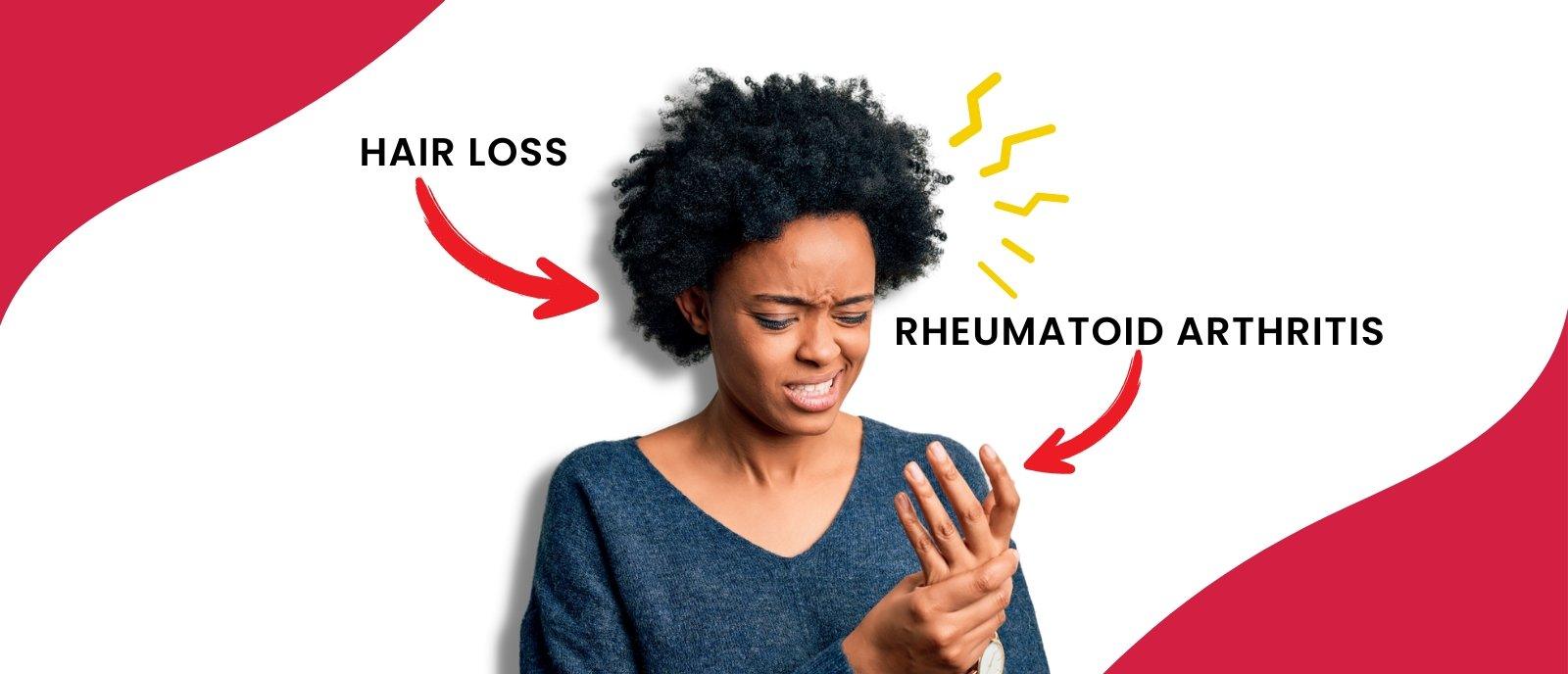
Link Between Rheumatoid Arthritis and Hair Loss
Commonly if you have an autoimmune disease, there is a big chance that you will likely develop additional autoimmune diseases. One of these is alopecia areata, which causes loss of hair centralized on the scalp, or all over the body. Corticosteroids, steroid shampoo, or minoxidil may help alopecia localized on the scalp, but treatment is more challenging when it affects the whole body. It is advised to consult a dermatologist if you are experiencing this. Wrong medication may worsen your case and can cause irreversible damage on your hair and scalp.
People with Rheumatoid Arthritis are also more likely to develop hypothyroidism. This is a thyroid hormone deficiency that affects women four times more than men. One type is an autoimmune disease called Hashimoto’s thyroiditis. Symptoms include thinning hair, dry skin, fatigue, and inability to tolerate cold. Hypothyroidism is treated with supplemental thyroid hormones.
Rheumatoid Arthritis Medications And Hair loss
Some people withRheumatoid Arthritis may experience hair loss as a symptom of the disease. For others, hair loss may be a side effect of RA treatment. Certain RA medications have the potential for causing hair loss, although this is a fairly rare side effect. Methotrexate works by stopping cells from growing, including cells that cause inflammation. Unfortunately, it’s not targeted solely at those cells and may also affect hair follicles. However, this happens only in one to three percent of people using this medication.
Two classes of drugs that doctors commonly use to treat Rheumatoid Arthritis are disease modifying antirheumatic drugs (DMARDs) and biologics. Some of the drugs within these two groups can cause hair loss.
DMARDS
DMARDs are the most common treatment for Rheumatoid Arthritis. These drugs suppress the immune system, thereby reducing chronic inflammation.
Methotrexate
Methotrexate is the DMARD that doctors most commonly prescribed for Rheumatoid Arthritis. This drug works by stopping the growth of the body’s cells.
Methotrexate is first used as an anticancer drug. As a Rheumatoid Arthritis treatment, it stops the growth of the immune cells that trigger chronic inflammation.
Due to the action of the drug, methotrexate can also stop the growth of cells that support the hair follicles. The base of the hair follicle can then weaken, causing the hair to become loose. In addition methotrexate also depletes the body of the B vitamin folate, which promotes healthy hair.
Although only 2-4% of methotrexate users experienced hair shedding and thinning still, methotrexate is considered a culprit when it comes to hair loss.
Leflunomide
Leflunomide is another type of DMARD that many people take in combination with or instead of methotrexate. Approximately 20% of people experience hair loss as a result of taking leflunomide.
Biologics
Biologics are a genetically engineered group of drugs that originate from living cells. These drugs specifically target parts of the immune system that stimulate inflammation.
Etanercept and adalimumab are two biologic drugs that may cause hair loss.
Experts do not know why this is the case. Some suggest that biologics may disrupt the balance of a type of protein that allows cells to communicate and also plays a role in hair follicle regeneration.
When you experience a medication-related hair loss, it usually causes thinning rather than falling out in patches. The amount of hair on your brush or in the shower may look alarming, but it may not be much more than you normally lose in a day. Most women lose about 100 strands of hair a day, and some may lose up to 150.
What To Do And How To Treat Hair Loss
Ask your Doctor
If you notice you are losing your hair, you should discuss it with your rheumatologist. They may want to run tests or refer you to a dermatologist to identify the cause of the hair loss, which could be related to, for instance, your thyroid, skin infection, or an iron deficiency.
Let your hair rest
Avoid overworking your hair. Blow drying and heavy styling products may stress your hair, so let it air dry and use combs with wide teeth that are less likely to catch snags and pull out more hair. Avoid hair coloring as it can stress the hair and use gentle styling products that add volume.
Take your supplements
People taking methotrexate or leflunomide may benefit from taking biotin supplements. Biotin may help nourish the health of your hair, including potentially slowing the hair loss. Taking a B complex vitamin or getting B12 shots may also be useful.These B vitamins can help protect against hair loss. Try our Biotin Vegetarian Strawberry Gummies For Hair Growth
Avoid Stress
Hair loss of any kind can sometimes be a source of psychological distress. Some people may become depressed, anxious, or socially withdrawn as a result of hair loss. Just relax and take it easy. Bear in your mind that it is not the end of the world and it can be cured.
Have A Healthy Hair Care Routine
- Avoiding scrubbing the scalp when washing the hair
- Allowing the hair to dry naturally after showering
- Combing the hair only when necessary, such as when styling it or removing tangles
- Avoiding pulling or tugging on the hair when brushing or combing
- Using a moisturizing conditioner to remove tangles
- Avoiding hairstyles that pull on the hair
- Use chemical free hair products like Glammednaturallyoil products
As Much As Possible Refrain For Medicines That Can Cause Hair loss
Another option may be to switch to Rheumatoid Arthritis medication that does not list hair loss as a potential side effect. Examples include the following DMARDs:\
While these drugs do not cause hair loss, each one has other possible side effects.
People should talk to a doctor about the side effects of each drug. The doctor will be able to offer advice on the most appropriate drug or combination of drugs.
Remember that hair loss can affect people differently. If your hair loss bothers you so much that you've resorted to, say, covering your head, seeing a dermatologist, or feeling uncomfortable leaving the house, share those details with your doctor so he or she knows exactly how the symptom is affecting your daily life. On the other hand, if your hair loss is mild or not noticeable and doesn't cause you any anxiety, then tell that to your physician, too. Your rheumatologist needs to understand the big picture before making any treatment recommendation or change.
We highly recommend keeping a good hair care regimen while you get through this and using our products consistently will improve your hair growth.



اترك تعليقًا
This site is protected by hCaptcha and the hCaptcha Privacy Policy and Terms of Service apply.